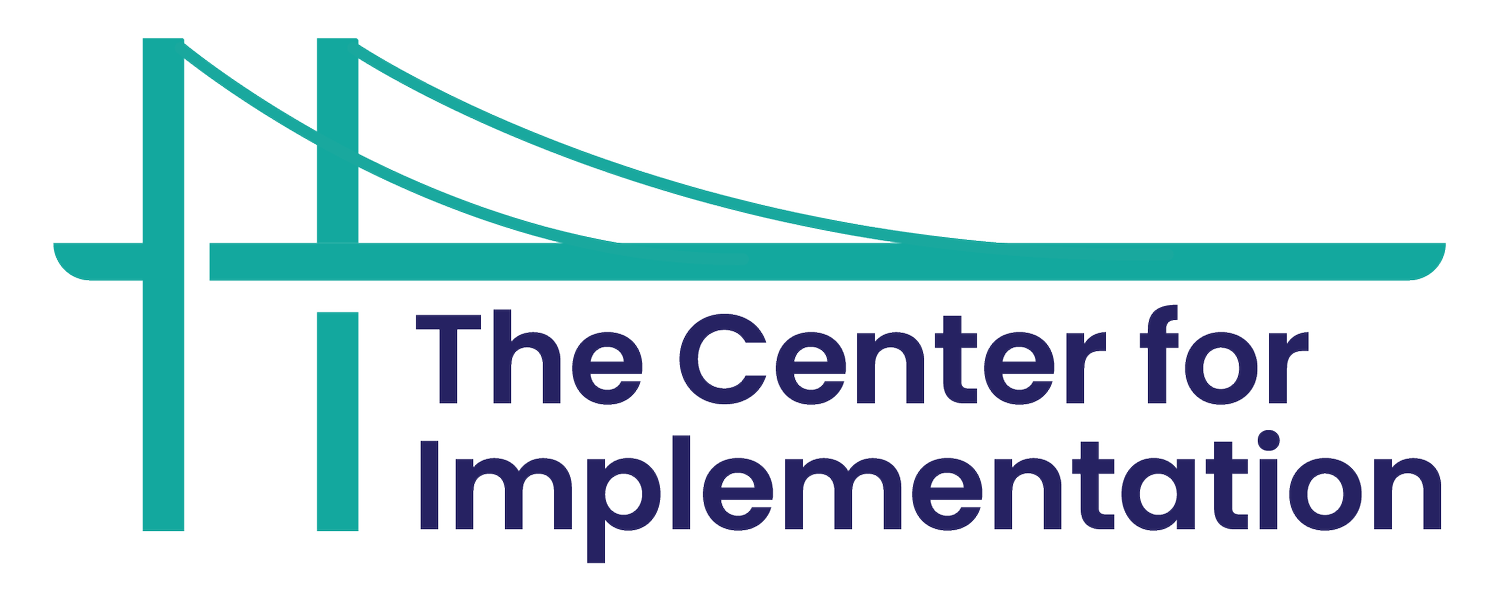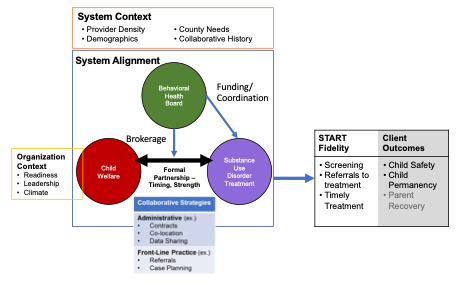Project Spotlight: Collaboration Strategies are Implementation Strategies
By Alicia C. Bunger, Associate Professor, College of Social Work, The Ohio State University,
Emmeline Chuang, Associate Professor, School of Social Welfare, University of California Berkeley,
Courtney Ebersole, Program Administrator; Ohio Association of County Behavioral Health Authorities,
Fawn Gadel, Director of Ohio START, Public Children Services Association of Ohio (PCSAO),
Amanda M. Girth, Associate Professor, John Glenn College of Public Affairs, The Ohio State University,
Marla Himmeger, Ohio START Program Manager, Public Children Services Association of Ohio (PCSAO),
Logan Knight, PhD Student, College of Social Work, The Ohio State University,
Teresa Lampl, Chief Executive Officer, The Ohio Council of Behavioral Health and Family Service Providers,
Kathryn Lancaster, Assistant Professor, College of Public Health, The Ohio State University,
Erica Magier, PhD Candidate; College of Social Work, The Ohio State University,
Jared Martin, PhD Student; College of Education and Human Ecology, The Ohio State University,
Jennifer Millisor, Ohio START Program Manager, Public Children Services Association of Ohio (PCSAO),
Rebecca Smith, PhD Candidate, John Glenn College of Public Affairs, The Ohio State University,
Rebecca Phillips, PhD Candidate, College of Social Work, The Ohio State University,
Cheri Walter, Chief Executive Officer; Ohio Association of County Behavioral Health Authorities,
Tina Willauer, Director of the National START Training and Technical Assistance Program; Purveyor of START, Children and Family Futures,
Gregory A. Aarons, Professor and Co-Director, UC San Diego Department of Psychiatry and ACTRI Dissemination and Implementation Science Center,
Byron J. Powell, Assistant Professor, Brown School and School of Medicine; Washington University in St. Louis,
Lisa Saldana, Senior Scientist, Oregon Social Learning Center
We are a multi-disciplinary team of implementation leaders and researchers investigating how organizations collaborate to implement cross-system interventions (i.e., efforts to integrate services delivered by different systems). Our work centers on the Ohio START program (US), an initiative to implement the National Sobriety Treatment and Recovery Teams (START) model statewide. START aligns child welfare and substance use treatment (along with other services) for families involved with the child welfare system due to parental substance use. Key components include early identification of substance use disorders (screening), rapid referral to treatment, frequent family team meetings to align case plans, peer recovery support, and wrap-around services.
Implementation depends on collaboration strategies
Implementing Ohio START depends on strong collaboration between public child welfare agencies and local substance use treatment organizations. We define collaboration strategies as methods for aligning organizational operations and services, that are essential for successful implementation of cross-system interventions like Ohio START. At the frontlines, caseworkers and clinicians refer clients to one another, might develop joint case plans, and share information to coordinate care. At the organizational-level, agency leaders may support frontline collaboration by co-locating staff or by negotiating formal (i.e., contractual) or informal data sharing, joint programming, or shared funding arrangements.
What collaboration strategy will work best?
It is not always clear which collaborative strategies lead to effective implementation. In the early stages of Ohio START, we observed that collaborative strategies that worked well in one agency (e.g. contracting with an organization for a specific type of service) didn’t always work in others. One of our aims is to examine the collaborative strategies associated with better implementation and service delivery outcomes in different communities. A second aim is to investigate the extent to which strong coalitions and governing bodies such as community behavioral health boards influence cross-system collaboration.
Our work is guided by a theory-informed conceptual model (Figure 1). Specifically, we used the Exploration, Preparation, Implementation, and Sustainment (EPIS) framework to identify determinants of implementation including features of the outer (system) and inner (organizational) context across phases of the implementation process. The EPIS framework conceptualizes collaborative strategies as bridging factors that link these contexts. Our model is also informed by collaborative governance theories, which suggest that effective collaborative strategies may vary based on organizational partners’ goals, local context, and resources. This model informed our study questions and analytic approach. We plan to apply configural comparative methods with mixed methods data (in part, from the larger evaluation). This will identify collaborative strategies (or combinations of) that may vary across different community contexts but lead to strong implementation, timely service delivery, and better family outcomes. Study findings will inform a collaboration strategies toolkit for agency leaders to help expedite and strengthen partnerships needed to implement START and other cross-system interventions.
Our work is funded by the National Institute on Drug Abuse, and the Robert Wood Johnson Foundation’s Systems for Action Program. Visit our project site.
This article was featured in our monthly Implementation in Action bulletin! Want to receive our next issue? Subscribe here.

